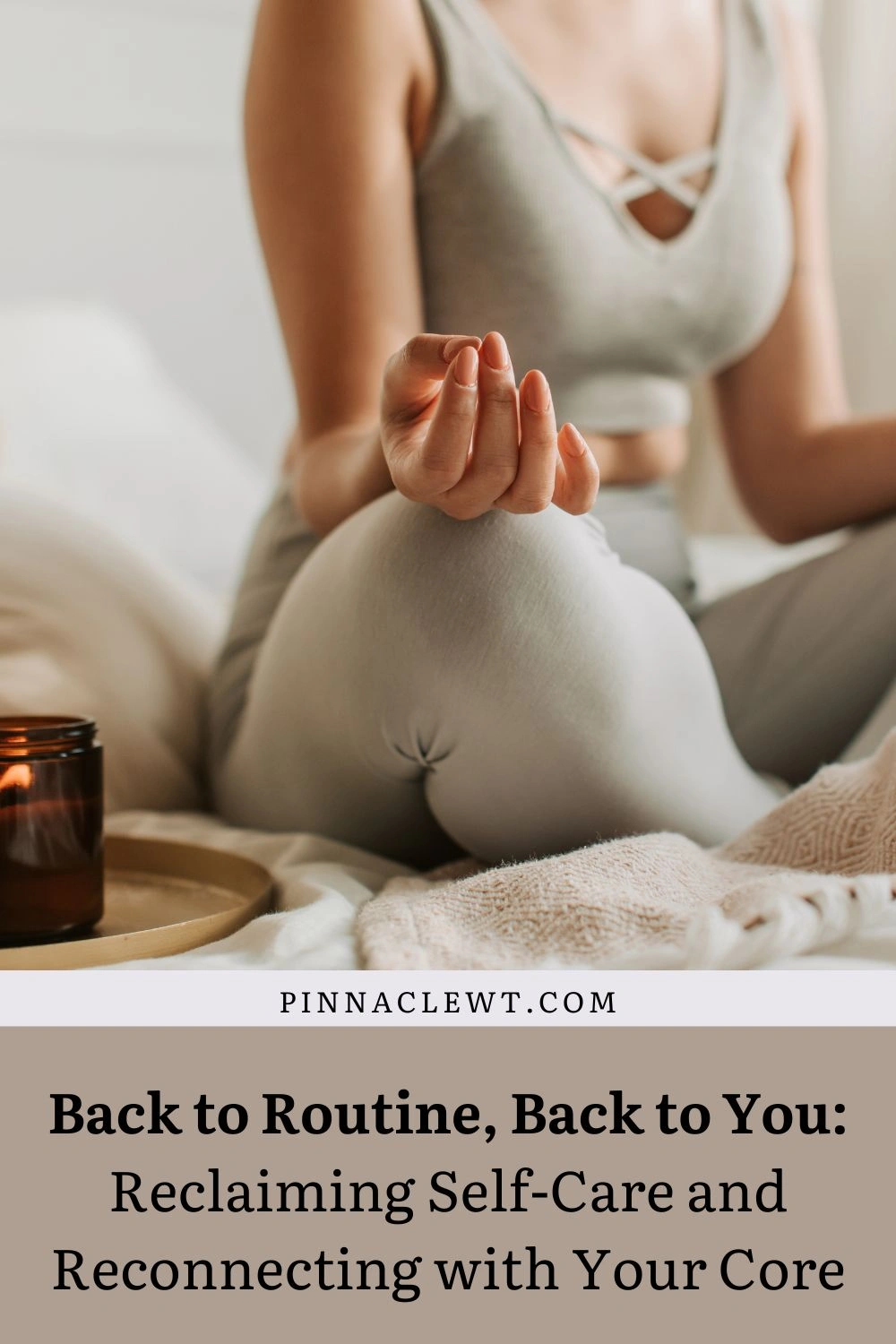September is a season of transition. Whether you’re stepping into a quieter house after a busy summer, returning to your regular work schedule, or simply noticing the shift in seasons, this time of year offers a chance to reset.
It’s a natural moment to reflect and re-establish supportive routines—especially when it comes to your body and your well-being.
As a pelvic health physical therapist, I often see women during this time of year who are feeling out of sync with themselves. Summer has a way of pulling us out of our normal rhythms. It’s fun, full, and sometimes overwhelming. Whether you spent your summer traveling, entertaining family, working more hours, or simply soaking in the sunshine, now is the perfect time to check in with your body and ask: What do I need right now?
This blog is your gentle nudge to reconnect with yourself and your self-care routine.
Why Self-Care Routines Matter (and Why It’s Okay to Begin Again)
When life is in go-mode, we tend to get by on autopilot. And for many women, that means:
- Going to bed later than planned and waking up feeling depleted
- Skipping movement because “it’s just too much” to think about
- Surviving on caffeine and quick snacks
- Letting hydration, supplements, and nervous system care fall to the wayside
Routine isn’t just about schedules. It’s about creating rhythms that support your physical, emotional, and mental well-being.
If your self-care routine went out the window this summer, you’re not alone. And the good news is—it doesn’t take much to start feeling better again.
5 Ways to Reset Your Self-Care Routine This Fall
1. Reset Your Sleep Schedule
Start by aiming for consistent bedtime and wake-up times. Reduce screen exposure after dinner and consider blue light blocking glasses or a sleep mask. Small tweaks to your evening routine can improve hormone regulation and help your nervous system wind down more easily.
If you’re someone who has gotten used to scrolling late into the night or working odd hours during the summer, you might notice how even one week of consistent sleep improves your mood, energy, and ability to cope with stress. Hormones like cortisol and melatonin work best when your body is following a routine—and so does your nervous system.
2. Reestablish Hydration Goals
After a summer of iced coffee, fruity drinks, and chaotic routines, it’s time to come back to water. Aim for half your body weight in ounces of water per day. Sip slowly throughout the day instead of gulping. If you’ve struggled with bladder urgency, proper hydration (not less!) can actually reduce irritation. Electrolyte support—like magnesium or trace minerals—can also help your body better absorb water and stay hydrated.
One patient I worked with shared that she only drank one glass of water and one cup of coffee each day. She never felt thirsty but was dealing with frequent urination and assumed water would make it worse. With gentle education and tracking, she began sipping throughout the day and paid attention to urine color as a hydration marker. Her symptoms improved, her energy increased, and she felt more in tune with her body.
3. Take the Guesswork Out of Meals
Meal planning doesn’t have to mean full-on batch cooking. Even just jotting down 3–4 meals you plan to make for the week and grocery shopping with that in mind can reduce mental load. Add in quick, protein-rich snacks (boiled eggs, protein shakes, jerky, cottage cheese) to keep blood sugar stable and energy levels more consistent.
When you nourish yourself with balanced meals and quality proteins, you support your hormones, brain health, blood sugar regulation, and muscle recovery. Bonus: when your blood sugar is stable, you’re less likely to hit that mid-afternoon crash or sugar craving.
4. Move Your Body—Gently and Often
This isn’t about a hard reset or punishing workouts. Start with short daily walks or gentle stretches. Choose just one or two exercises that feel good and grounding:
- Wall Lean Breathing: Stand with your feet 18″ from the wall and back against it. Slowly belly breathe five times.
- Incline Plank at the Counter: Engage your core and glutes, breathe slowly.
- Standing Balance: Practice standing on one foot for 20 seconds per side.
Movement is a form of self-respect. It helps regulate hormones, improve mood, and gently support your core and pelvic health. If you’ve worked with us in the past and had a movement routine, now is the time to bring it back—start small and be consistent.
5. Reconnect with Basic Wellness Tools
If you’ve been skipping your supplements or forgetting those habits that made you feel great—this is your reminder to bring them back. Some favorites include:
- Magnesium (especially glycinate or malate): for stress, sleep, and muscle recovery
- Omega-3s: to support hormones, inflammation, and brain function
- B-complex: for energy and nervous system support
Your wellness routine doesn’t have to be complicated. Start with the basics and let your body tell you what it needs next.
What About Core & Pelvic Health?
Maybe you’ve done work in the past to improve bladder leaks, pelvic organ prolapse, or core strength—and that care got put on hold. Or maybe you’ve meant to start but haven’t gotten around to it yet.
This is your permission slip to start again.
Core and pelvic floor health are not separate from your overall wellness. They are deeply connected to your breath, posture, stress, strength, and movement patterns. At Pinnacle Women’s Therapeutics, we help women of all ages:
- Rebuild core strength after birth
- Improve bladder and bowel health
- Resolve pelvic pain
- Navigate perimenopause and menopause changes
You don’t need to be in crisis to start care. You just need to be ready to feel better.
The Power of Mini Habits
If you’re feeling overwhelmed or unsure where to start, try this: pick one thing that feels doable
and let that be your win for the day.
- Drink a glass of water when you wake up
- Do five breaths while resting your legs up on the couch
- Take a 10-minute walk before dinner
Mini habits help reduce resistance. They build confidence. And they add up. I often encourage my patients to “habit stack”—attach a mini habit to something they already do:
- Do five pelvic tilts while brushing your teeth
- Practice single-leg balance while waiting for your coffee to brew
- Stretch your arms overhead while watching the news
You’re Invited to Reconnect
If this season feels like your moment to begin again, we’d love to support you. Through a one-on-one evaluation in our Vancouver, WA clinic, we can help you create a plan that meets you exactly where you are.
Let this be your moment to refocus on YOU.
Contact us to schedule an evaluation
With warmth and encouragement,
Buffy Stinchfield, PT
The Pelvic Health Coach
Founder, Pinnacle Women’s Therapeutics




